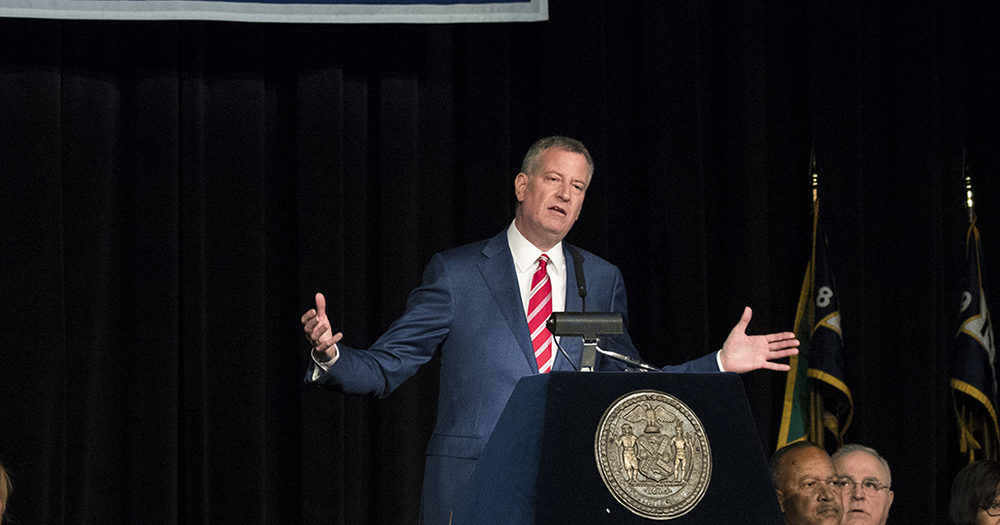No recent New York City mayor has gotten through his years in office without a corruption scandal, and Mayor de Blasio is no exception. One critical difference, however: De Blasio has explicitly defended a top-level commissioner accused of serious, willful, repeated misuse of taxpayer resources.
Last week, the city’s independent Department of Investigation announced that, using GPS and toll-collection data, it had found that Correction Commissioner Joseph Ponte had, in 2016, driven “his assigned [city] vehicle out of New York State on 28 occasions, for multiple days at a time, with many of the trips to areas of Coastal Maine, and used his vehicle outside of New York State on personal business for 90 calendar days . . . approximately 24.6 percent of the calendar year.”
Ponte logged 18,500 miles on his city SUV for personal trips during 2016, charging the city for $1,043 in gas and $746.56 in tolls.
A New York mayor oversees 26 major departments, from police to parks. Not all his appointments will turn out to be sound. Under Mayor Michael Bloomberg, Finance Commissioner Martha Stark fell under scrutiny for, among other problems, keeping on board a deputy commissioner’s spouse after he was found to have billed the city for hours he hadn’t worked. She resigned soon afterward.
Bloomberg’s administration also had to use the legal system to recover hundreds of millions of dollars stolen via kickbacks for the CityTime payroll-upgrade project.
Mayor Rudy Giuliani showed questionable judgment in hiring the son of a political ally to run the Housing Department: Russell Harding was later charged with embezzlement and child pornography. And under ’80s-era Mayor Ed Koch, the top transportation official and much of his team resigned amid a bribery scandal that also led to the suicide of the Queens borough president.
But it’s hard to remember any of these mayors outright defending corruption. In fact, Koch later said that scandals on his watch plunged him into severe depression.
Not so with de Blasio, who maintains his what-me-worry arrogance even when it comes to top-level misconduct. Ponte’s behavior violates city rules and is outright theft from the city. When one considers the depreciation of the city’s SUV, he willfully stole thousands of dollars.
Ponte didn’t even use this car for city business: Investigators found he commuted from his home to headquarters only four times.
Besides the theft, the investigators uncovered worrisome signs about Ponte’s work habits. He spent 35 full workdays, seven weeks, outside the city, even as Rikers Island, the jail he oversees, struggles with violence among inmates and between inmates and guards. On 29 of those days, he reported himself as on the job.
The city, then, has put not only a thief in charge of this critical agency but a shirker, too: Imagine if your boss found out you had clocked in for seven weeks when you were on vacation.
DOI Commissioner Mark Peters can’t fire or prosecute anyone. But he can (and has) referred this case for possible criminal prosecution, saying senior officials “must be accountable for their actions.” De Blasio’s only appropriate response is to get rid of Ponte immediately.
Instead, the mayor has defended his commissioner. In a radio interview, he professed “absolute faith” in Ponte. As for the thousands of dollars in misappropriated resources, de Blasio said “if there needs to be anything done to compensate, we’ll work that out.”
“I want to remind you that I just released an $84 billion budget, so the fact that there’s $1,000 in gas expenses, you know, it’s put in perspective,” he added.
Where to start? As Peters said, “Ponte and others did not receive official ‘advice’ that they could use their cars for personal trips out of state . . . There can be no defense of this behavior, and City Hall harms government integrity by even trying.”
Perhaps worst of all is the idea that the city can afford the odd felony theft by top employees because it spends lots of money. De Blasio loves the idea of raising taxes, even when the city is flush with cash. But even people who support higher taxes won’t do so for long if they see that the city is not safeguarding their money.
Behind seemingly inexplicable behavior is usually a rational explanation. De Blasio and his top staff have themselves broken the “intent and spirit” of laws meant to discourage corruption, prosecutors found (though they didn’t find enough to bring charges).
Ponte was caught because of an anonymous tip. Perhaps the mayor is concerned that if he’s not nice to his appointees, even when they’re stealing, investigators will receive more such anonymous tips.
This piece originally appeared in the New York Post, adapted from City Journal
______________________
Nicole Gelinas is a senior fellow at the Manhattan Institute and contributing editor at City Journal. Follow her on Twitter here.
This piece originally appeared in New York Post
